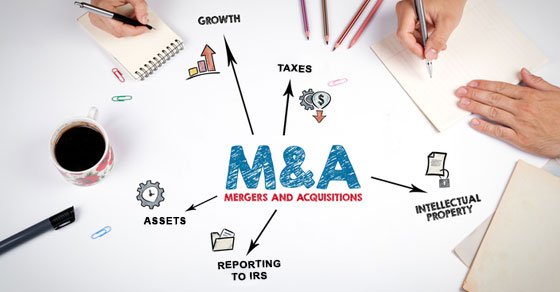M&A Transactions: Be Careful When Reporting To the IRS
- Learn how to properly report an M&A transaction.
- Find out what you must report.
- Learn about depreciable and amortizable assets.
- Don’t forget form 8594!
- Find out what the IRS might examine and what might trigger an audit.
Low interest rates and other factors have caused global merger and acquisition (M&A) activity to reach new highs in 2021 (according to Refinitiv, a provider of financial data). It reports that 2021 is set to be the biggest in M&A history. The United States alone accounts for $2.14 trillion worth of transactions already this year. Are you considering buying or selling a business — or are you in the process of an M&A transaction? It’s important that both parties report it to the IRS and state agencies in the same way. Otherwise, you may increase your chances of an audit.
If a sale involves business assets (as opposed to stock or ownership interests), the buyer and the seller must generally report to the IRS the purchase price allocations that both use. Each party may do this by attaching IRS Form 8594, “Asset Acquisition Statement,” to each of their respective federal income tax returns for the tax year that includes the transaction. Fiducial has more on this topic below!

Here’s what you must report in an M&A transaction
Have you bought business assets in an M&A transaction? Then, you must allocate the total purchase price to the specific assets that are acquired. The amount allocated to each asset then becomes its initial tax basis. For depreciable and amortizable assets, the initial tax basis of each asset determines the depreciation and amortization deductions for that asset after the acquisition. Depreciable and amortizable assets include:
- Equipment,
- Buildings and improvements,
- Software,
- Furniture, fixtures and
- Intangibles (including customer lists, licenses, patents, copyrights and goodwill).
In addition to reporting the items above, you must also disclose on Form 8594 whether the parties entered into a noncompete agreement, management contract or similar agreement, as well as the monetary consideration paid under it.
What the IRS might examine
The IRS may inspect the filed forms to see if the buyer and the seller use different allocations. If the tax agency finds that different allocations are used, auditors may dig deeper and the examination could expand beyond the M&A transaction. So, it’s best to ensure that both parties use the same allocations. Consider including this requirement in your asset purchase agreement at the time of the sale.
The tax implications of buying or selling a business are complex. Price allocations are important because they affect future tax benefits. Both the buyer and the seller need to report them to the IRS in an identical way to avoid unwanted attention. To lock in the best results after an acquisition, consult with Fiducial before finalizing any transaction.
Call Fiducial at 1-866-FIDUCIAL or make an appointment at one of our office locations to discuss your situation.
Ready to book an appointment now? Click here. Know someone who might need our services? We love referrals!
For more small business COVID-19 resources, visit Fiducial’s Coronavirus Update Center to find information on SBA loans, tax updates, the Paycheck Protection Program, paid sick and family leave.









